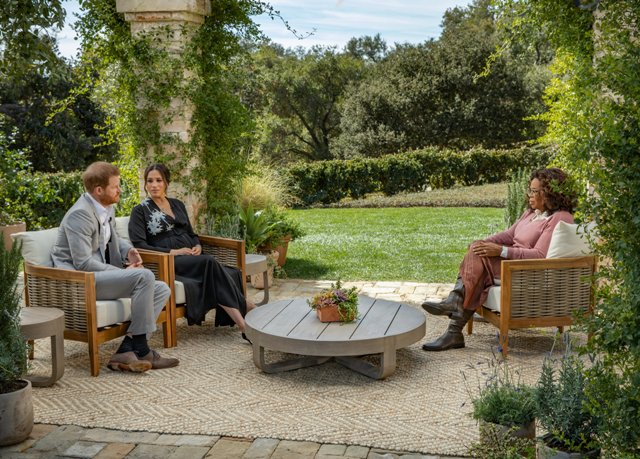
Allegations of racism made against the British royal family in an incendiary interview on US television have reverberated around the world, outraging many in the UK and reviving debate in some countries over membership of the Commonwealth and even the future of the monarchy.
The controversial interview of Meghan Markle, whose mother is African American, and her husband, Prince Harry, by the US chatshow host Oprah Winfrey aired claims that a senior member of the royal family raised ‘concerns’ about how dark their son Archie’s skin might be when born. The Duke and Duchess of Sussex also spoke about how she had felt silenced and contemplated suicide. Harry, grandson of Queen Elizabeth, said racism – especially from the British tabloid press – was a ‘large part’ of why the couple moved to California and said his father , Prince Charles, had refused to take his phone calls.
Buckingham Palace issued a brief statement saying the Queen was ‘saddened’ and the ‘concerning’ issues raised would be addressed privately. British public opinion swiftly turned against the couple: most people now have a negative view of them, as well as of Charles, a YouGov poll found. It also revealed a big discrepancy in reactions according to age, with younger people liking the pair, while those aged 65 and over generally dislike them, and a similar contrast in attitudes to the monarchy, with most 18-24-year-olds now supporting an elected head of state.
Reactions from politicians and the media in Britain were equally polarised, with the Conservative environment minister Zac Goldsmith saying Harry was ‘blowing up his family’, while the broadcaster Piers Morgan called the interview a ‘disgraceful betrayal’ and ‘self-serving nonsense’. However, the former Independent editor Simon Kelner said: ‘The royal family missed a historic chance to … set an example to other representative institutions (the church, the City, the legal establishment, the press) where casual racism still survives.’ Ingrid Seward, of Majesty magazine, called it ‘the most damning condemnation of the royal family and how they operate I’ve ever heard’. The historian Robert Lacey said it was ‘testimony to a dysfunctional family’. The pressure group Republic called it the British monarchy’s ‘worst crisis since the abdication [of King Edward VIII] in 1936’. Simon Jenkins invoked Walter Bagehot’s observation that a republic had ‘insinuated itself beneath the folds of a monarchy’, warning that ‘to harness the potency of celebrity to enhance the constitutional status of monarchy … was a bad mistake.’
In the US, there was a groundswell of support for Markle, with celebrity friends such as the tennis player Serena Williams tweeting about the ‘pain and cruelty’ she had experienced. Bernice King, daughter of Martin Luther King, tweeted: ‘Royalty is not a shield from the devastation and despair of racism.’ Nina Parker, another talkshow host, tweeted: ‘Black women believe Meghan … we know exactly what micro-aggressions look like. And how they slowly drive you insane.’ However, the right-wing black commentator Candace Owens was critical of the former actor, writing: ‘The British press has been rude to Meghan Markle … but they have not been racist.’ For the black American academic Salamishah Tillet, writing in the New York Times, it was Harry’s ‘racial awakening’ that was noteworthy, such as his comment to Winfrey that more than 70 female MPs, both Tory and Labour, ‘called out the colonial undertones of articles and headlines written about Meghan. Yet no one from my family ever said anything. That hurts.’ Harry, she said, had ‘declared his independence from British racism’.
In Canada, the debate around the interview quickly moved on to whether the country should keep the Queen as head of state. Jagmeet Singh, leader of the opposition New Democratic Party, said the monarchy was ‘in no way beneficial to Canadians’. The prime minister, Justin Trudeau, had to play down talk of constitutional reforms. However, a poll found only 22% support for Charles to succeed the Queen, with 45% preferring an elected head of state. Social media was peppered with comments such as: ‘We must never spend even a penny more on the British monarchy. Get Canada out of the Commonwealth now.’
Republicanism had a similar boost in Australia, which voted in 1999 to retain the Queen as head of state largely because the abolitionists were split. ‘Our head of state should be an Australian,’ the former prime minister Malcolm Turnbull told ABC TV, adding: ‘In Australia, there are more Elizabethans than there are monarchists.’ Sandy Biar, head of the Australian Republican Movement, said: ‘We saw a British monarchy not in step with modern Australia.’
But as Tristin Hopper pointed out in Canada’s National Post, one good reason to retain the monarchy in many Commonwealth countries is the constitutional challenge of legislating to remove the Queen as head of state – in Ottawa’s case, steering a bill through national parliament and each province’s legislative assembly. It would be, the headline suggested, ‘a royal pain in the butt’.
Related articles:
Sir Shridath Ramphal – Opinion: The Queen and her stand against racism in the Commonwealth



